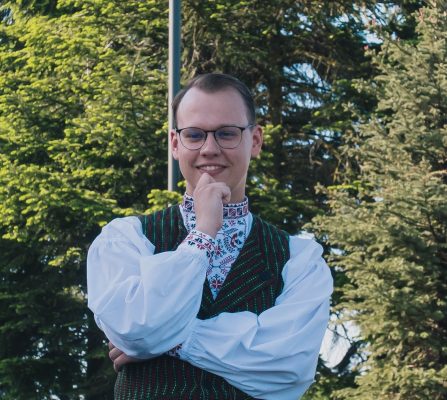
Titas Kumetaitis
IIRPS VU Politics and Media master's programme student
You are currently a Master’s student in Politics and Media at IIRPS VU and have also completed a Bachelor’s in Political Science. What made you decide to continue your studies at the Institute?
The Institute is definitely a space to grow and discover yourself. Learning here is exciting – each subject is unique and includes different academic fields: communication, philosophy, journalism, visual studies, etc. So it’s very versatile but, at the same time, unique. I like that; this way, I can discover new directions I might not normally have been interested in.
This is the second year you’ve been involved in the VU Song and Dance Ensemble; what do you think is the importance of folk art and its preservation for people?
Personally, I find in folk art a lot of answers to life or even existential questions that we all face: what is the meaning of everyday life? Where does the beauty of life lie? Surprisingly, we can find the answers to these questions in the lyrics of folk songs – we just have to listen to them. Folk art is an ancestral legacy that encodes a certain foundation that reminds us who we are and what we live for. Being in an ensemble not only allows you to learn the answers to these questions but also to live and create your own future and the future of others. I am immensely grateful to the VU Ensemble community for the opportunity to discover the beauty and meaning of folk art.
You work at the European Commission Representation in Lithuania; how did your journey here begin? Do you have to apply the knowledge you have acquired at the Institute at work? How do you get on?
My path to the European Commission (EC) Representation in Lithuania is very much intertwined with my path to the Institute. I was interested in the European Union when I was still at school, so I decided to join the Team Europen Junior network run by the EC Representation. Membership of the Team Europe Junior and my civic activities led me to choose to study at IIRPS VU. I also did an internship at the EC Representation as a fourth-year student, after which I was invited to join the team.
Currently, I work in the Representation’s Communication Group and contribute to initiatives that help disseminate the European Commission and the European Union to the public. My chosen Master’s degree is very relevant to my work activities, so I am excited to be able to put what I have learned into practice immediately. However, it is probably the interdisciplinary skills I have acquired – the ability to present my ideas, to argue, to find credible answers – that I apply most at work. This, in my opinion, is one of the greatest advantages of studying at TSPMI.
How do you manage to balance your studies, work, and the Ensemble?
I would be lying if I said it was easy. I have a fairly strict agenda that I try to follow, and I prioritise accordingly – what I have to do, what I want to do and how much time I have. But I don’t regret it because it allows me to make productive use of every available moment. Bend the tree while it’s young, as they say!
In 2022, your bachelor’s thesis was named the best in comparative politics. What advice would you give to students writing their final theses this year?
The same thing I would wish for myself – perseverance. Writing a thesis is like a roller coaster – one day, the work seems pointless, impossible, and hopeless, and the next day (after a good night’s sleep!), inspiration strikes, a new idea is born, and you can resist it, and continue to develop the main idea of your work. Creative suffering is temporary, but the fruits of perseverance and the ability to analyse will last a long time.
What would you like to wish the IIRPS VU community?
I wish the community to remain open, tolerant, and encouraging to improve and to seek politics in seemingly non-political processes.







